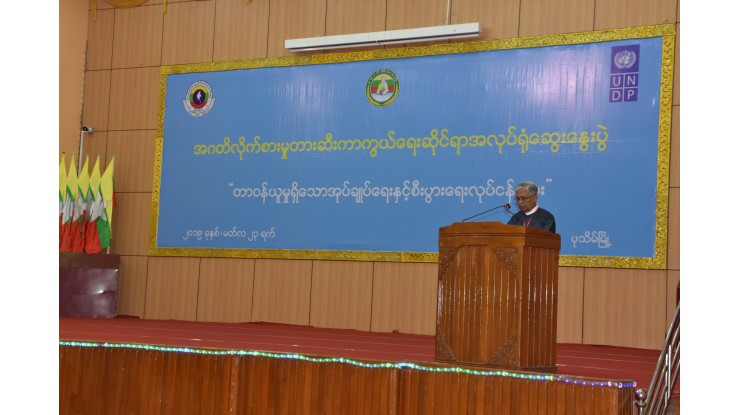ဧရာဝတီတိုင်းဒေသကြီး ပုသိမ်မြို့၊ အဂတိလိုက်စားမှုတားဆီးကာကွယ်ရေးအလုပ်ရုံဆွေးနွေးပွဲ၌ ပြောကြားသော ကော်မရှင်ဥက္ကဋ္ဌ၏ အမှာစကား
- Sat, 23 March 2019

ဧရာဝတီတိုင်းဒေသကြီး ပုသိမ်မြို့၊ အဂတိလိုက်စားမှုတားဆီးကာကွယ်ရေးအလုပ်ရုံဆွေးနွေးပွဲ၌ ပြောကြားသော ကော်မရှင်ဥက္ကဋ္ဌ၏ အမှာစကား
( ၂၃ - ၃ - ၂၀၁၉ )
၁။ နှုတ်ခွန်းဆက်ခြင်း။
၂။ အခုလိုတိုင်းဒေသကြီး / ပြည်နယ်များတွင် အဂတိလိုက်စားမှုတားဆီးကာကွယ်ရေး အလုပ်ရုံ ဆွေးနွေးပွဲများပြုလုပ်ခြင်းသည် ပြစ်မှုဖြစ်ပွားပြီးမှ စုံစမ်းစစ်ဆေး တရားစွဲဆိုအရေးယူ ဆောင်ရွက်ရခြင်းထက် အဂတိလိုက်စားသောပြစ်မှုများမဖြစ်ပေါ်မီ ကြိုတင်တားဆီး ကာကွယ်နိုင်ရေးကို ကော်မရှင်က ပိုမိုအလေးထားသောကြောင့်ဖြစ်ပါသည်။ သက်ဆိုင်သူ များအတွက် ထိခိုက်နစ်နာမှုအနည်းဆုံး၊ နိုင်ငံတော်အတွက်လည်း ဆုံးရှုံးနိုင်ခြေအနည်းဆုံး ဖြစ်သည့် အဂတိလိုက်စားမှုတားဆီးကာကွယ်ရေးနည်းလမ်းများကို ကော်မရှင်က အကြိမ်ကြိမ် အကြံပေးပြောကြားခဲ့သော်လည်း လက်တွေ့တွင်မူ အဆိုပါတားဆီးကာကွယ်ရေး လုပ်ငန်း စနစ်သည် ပြည်ထောင်စုဝန်ကြီးဌာနတချို့တွင် ပြည့်ပြည့်ဝဝ အကောင်အထည်ပေါ်မလာ သေးဘဲ အရှိန်ယူနေဆဲကာလအဖြစ်သာ ရှိနေဆဲဖြစ်ပါသည်။ မည်သို့ပင်ဖြစ်စေ စုံစမ်း စစ်ဆေး အရေးယူဆောင်ရွက်မှုများကို ကော်မရှင်အနေဖြင့် ထိထိရောက်ရောက် ဆက်လက် တိုးမြှင့် ဆောင်ရွက်သွားရဦးမှာဖြစ်ပါသည်။ ပြီးခဲ့သည့် ၂၀၁၈ ခုနှစ်အတွင်း ကော်မရှင်သည် အဂတိလိုက်စားကြောင်း ခိုင်လုံသောအထောက်အထားရှိသည့် ပုဂ္ဂိုလ် ( ၄၆ ) ဦးကို တရားရုံးများသို့ တရားစွဲဆိုတင်ပို့နိုင်ခဲ့ပါသည်။ အဆိုပါ တရားစွဲခံရသော ပုဂ္ဂိုလ်များ၏ ထွက်ဆိုချက်များကို လေ့လာသုံးသပ်ရာတွင် ရာထူးငယ်သူများသာမက ရာထူးကြီးသူအချို့ပင် အဂတိလိုက်စားမှု၏ ပြစ်မှုမြောက်ခြင်းသဘောသဘာဝကို သေသေချာချာနားလည်ထားမှု မရှိခဲ့ကြကြောင်း တွေ့ရှိရပါသည်။ ဆယ်စုနှစ်များစွာ အဂတိလိုက်စားမှုတိုက်ဖျက်ရေး အစီ အစဉ် ပီပီပြင်ပြင်မရှိဘဲ နေလာခဲ့ကြရသည့်အတွက် ဌာနတွင်းဝန်ထမ်းအချင်းချင်း၌ဖြစ်စေ၊ ဌာနပြင်ပစီးပွားရေးလုပ်ငန်းများ သို့မဟုတ် အများပြည်သူလူထုနှင့်ပတ်သက်၍ဖြစ်စေ ထိတွေ့ ဆက်ဆံမှုအပြုအမူတချို့သည် အဂတိလိုက်စားသောပြစ်မှု ကျူးလွန်ရာရောက်နိုင်သည်ကို နားမလည်ကြသဖြင့် အချိန်မီပြုပြင်ပြောင်းလဲခြင်းမပြုနိုင်ကြဘဲ လုပ်ရိုးလုပ်စဉ်အတိုင်း “ မဖြစ်တန်ရာ ” ဟုယူဆပြီး ဆက်လက်လုပ်ဆောင်နေကြခြင်းဖြင့် တရားစွဲဆိုခံရခြင်းများ အဖြစ်များကြောင်းကိုလည်း စိစစ်တွေ့ရှိရပါသည်။ ထို့ကြောင့် ကော်မရှင်သည် တရားစွဲဆို အရေးယူဆောင်ရွက်ရခြင်းများ လျော့ပါးသက်သာသွားစေရေးအတွက် ဖြောင့်မတ် တည်ကြည်မှုမြှင့်တင်ရေး ပညာပေးရေးလုပ်ငန်းများနှင့် တားဆီးကာကွယ်ရေးလုပ်ငန်းများ ကိုလည်း တချိန်တည်း တစ်ပြိုင်တည်း တိုးမြှင့်ဆောင်ရွက်သွားရန် လိုအပ်သည်ဟုသုံးသပ်ပြီး အလုပ်ရုံဆွေးနွေးပွဲများကို ဆက်လက်ဆောင်ရွက်နေရခြင်းဖြစ်ပါသည်။
၃။ လုပ်ပိုင်ခွင့်အာဏာရှိသူများအနေဖြင့် မိမိတို့ဌာနများတွင် အဂတိလိုက်စားမှုတိုက်ဖျက်ရေး သို့မဟုတ် တားဆီးကာကွယ်ရေးလုပ်ငန်းကို လုပ်တော့မည်ဟုဆုံးဖြတ်ပြီးလျှင် ပုံမှန် စည်းစိမ်ခံ သက်သောင့်သက်သာနယ်မြေ (Comfort zone) အတွင်း၌နေပြီး လုပ်ရိုးလုပ်စဉ် အတိုင်း လုပ်၍ရသောအလုပ်မျိုးမဟုတ်ဘဲ မိမိတို့ကိုယ်တိုင်နှင့် မိမိတို့အဖွဲ့အစည်းများကို အဂတိကင်းစင်သွားအောင် ခေါင်းဆောင်များနှင့် တာဝန်ရှိသူများကိုယ်တိုင်ကစတင်၍ စွန့်လွှတ်အနစ်နာခံ၊ အဆင်းရဲအပင်ပန်းခံပြီး စနစ်တစ်ခုလုံးကိုပြောင်းလဲသွားစေရန် တာဝန်ယူ ဆောင်ရွက်ရသည့်အလုပ်ဖြစ်ပါသည်။ တစ်နည်းအားဖြင့် စစ်မှန်သော ဒီမိုကရေစီပြုပြင် ပြောင်းလဲရေး အလုပ်တစ်ခုလည်းဖြစ်ပါသည်။ ဤကဲ့သို့သောပြုပြင်ပြောင်းလဲမှုများသည် အဂတိလိုက်စားမှုကိုဆန့်ကျင်သော ဒီမိုကရေစီအစိုးရသစ်များကဦးဆောင်ပြီး ဖြောင့်မတ် တည်ကြည်သော စီးပွားရေးလုပ်ငန်းရှင်များနှင့် နှစ်ပေါင်းများစွာအဂတိလိုက်စားမှု ဒဏ်ရာ ဒဏ်ချက်များကြောင့် ထိခိုက်နစ်နာနေခဲ့ရသောပြည်သူများက တခဲနက် ပူးပေါင်းပါဝင်လာ ကြမည်ဆိုလျှင် ကျိန်းသေ အောင်မြင်မှုရရှိမည်ဖြစ်ပါသည်။ ဤအောင်မြင်မှုအတွက် ကျွန်တော်တို့သံသယဖြစ်စရာမလိုပါ။ ကျွန်တော်တို့နိုင်ငံသည် တစ်နိုင်ငံလုံး အဂတိ လိုက်စားမှု ပျံ့နှှံ့ဖြစ်ပေါ်နေသောနိုင်ငံတစ်နိုင်ငံအဖြစ် သုံးသပ်အကဲဖြတ်မှုများရှိနေကြ သော်လည်း အစိုးရဌာနများအတွင်း၌ဖြစ်စေ၊ ပုဂ္ဂလိကစီးပွားရေးလုပ်ငန်းများနှင့် အရပ်ဘက် အဖွဲ့အစည်းများ၌ဖြစ်စေ၊ အဂတိလိုက်စားမှုကို ပင်ကိုရိုးသားဖြူစင်သော အသိစိတ်ဓာတ် ဖြင့် စွဲမြဲစွာဆန့်ကျင်နေကြသည့်လူများ အများအပြားရှိနေကြဆဲဖြစ်ပါသည်။ သို့ရာတွင် ထိုသူတို့သည် များသောအားဖြင့် ရာထူးဌာနန္တရအခွင့်အာဏာ၊ လာဘ်သပ်ပကာစီးပွားဉစ္စာ အပေးအယူများဖြင့် သူ့ဘာသာသူ မျှခြေဖြစ်နေသောအဂတိလိုက်စားမှု(Corrupt Equilibrium) နွံတောအတွင်း၌နစ်မြုပ်နေခဲ့ကြရပါသည်။ ယခုအခါ အဆိုပါပုဂ္ဂိုလ်များသည် အဂတိလိုက်စားမှု တားဆီးကာကွယ်ရေး၌ နေရာပြန်ယူကြပြီး အဂတိလိုက်စားမှုစနစ်ဆိုးကို တက်ညီလက်ညီ တိုက်ဖျက်ကြရန် အချိန်ကျရောက်နေပြီဖြစ်ပါသည်။ အဂတိလိုက်စားမှုစနစ်ကို တိုက်ဖျက်ရန် နိုင်ငံရေးဆန္ဒပြင်းပြနေသည့် နိုင်ငံတော်အစိုးရသည် ကော်မရှင်အား လွတ်လပ်စွာလုပ်ပိုင်ခွင့် ပေးထားခြင်းအားဖြင့်လည်းကောင်း၊ တိုင်ကြားမှုယန္တရားကို ကျယ်ပြန့်စွာဖွင့်ပေးထားခြင်း ဖြင့်လည်းကောင်း၊ အဂတိလိုက်စားမှု တားဆီးကာကွယ်ရေးအဖွဲ့ ( CPU ) များကို ပြည်ထောင်စုဝန်ကြီးဌာန ( ၁၅ )ခုတွင် စတင်ဖွင့်လှစ် အကောင်အထည်ဖော်ခွင့်ပြုခြင်းဖြင့် လည်းကောင်း၊ တစ်နိုင်ငံလုံးအတိုင်းအတာဖြင့် အရှိန်အဟုန်မြှင့်တင် ဆောင်ရွက်လျက်ရှိပါ သည်။ ပြည်ထောင်စုဝန်ကြီးဌာနများ၌ CPU ဖွဲ့စည်းပြီးသောဌာနများအနေဖြင့်လည်းကောင်း၊ CPU ဖွဲ့စည်းခြင်းမပြုရသေးသော်လည်း မိမိတို့ဌာနအတွင်း၌ အဂတိလိုက်စားမှုစနစ်ကို လျော့ကျသွားစေရန် မိမိတို့ကိုယ်တိုင်တာဝန်ယူကြမည်ဟူသော ပင်ကိုဖြောင့်မတ် တည်ကြည် သော စိတ်ကောင်းစေတနာရှိသည့် နိုင်ငံ့ဝန်ထမ်းကောင်းများအနေဖြင့်လည်းကောင်း −
(၁) မြို့နယ်နှင့်ကျေးလက်ဒေသအသီးသီးတွင် မိမိဌာနနှင့်ပတ်သက်၍ အဂတိ လိုက်စားမှု ဖြစ်ပွားနေမှုများကို စိစစ်ဖော်ထုတ်ရန်၊
(၂) သေးငယ်သောလာဘ်ပေးလာဘ်ယူမှုများရှိခဲ့လျှင် နိုင်ငံ့ဝန်ထမ်းဥပဒေနှင့်အညီ အရေးယူနိုင်ရေးတင်ပြသွားရန်၊ ပိုမိုကြီးမားသော အဂတိလိုက်စားမှုများဖြစ်ခဲ့ လျှင် ပြည်ထောင်စုဝန်ကြီးဌာန (သို့မဟုတ်) သက်ဆိုင်ရာအစိုးရအဖွဲ့မှတဆင့် ကော်မရှင်သို့ ဆောလျင်စွာ လွှဲပြောင်း ပေးပို့ရန်၊
(၃) ဌာနကကျင့်သုံးနေသည့် နည်းဥပဒေ၊ လုပ်ထုံးလုပ်နည်း ၊ စည်းမျဉ်းစည်းကမ်း၊ အမိန့်ညွှန်ကြားချက်များ၌ အဂတိလိုက်စားမှုဖြစ်နိုင်ခြေ အန္တရာယ်များကို တွေ့ရှိရလျှင် ပြည်ထောင်စုဝန်ကြီးဌာန CPU နှင့် သက်ဆိုင်ရာအစိုးရ အဖွဲ့အစည်းတို့ကို ကြိုတင် တင်ပြသွားသင့်ပါကြောင်း ကော်မရှင်အနေဖြင့် တိုက်တွန်းပြောကြားလိုပါသည်။
၄။ ဌာနတစ်ခုတွင် အဂတိလိုက်စားမှုပြစ်မှုတစ်ခု ပေါ်ပေါက်လာပြီဆိုလျှင် ဆောင်ရွက်ရသော လုပ်ငန်းအများအပြားရှိပါသည်။ ကာယကံရှင်များနှင့် ၎င်းတို့၏မိသားစုများအတွက် ကြီးမားသောထိခိုက်နစ်နာမှု ဖြစ်ရသည်သာမက သက်ဆိုင်ရာအစိုးရဌာနများနှင့် ကော်မရှင် အပါအဝင်အတွက် နိုင်ငံတော်မှကျခံပေးရသည့် ကုန်ကျစရိတ်များ၊ ဆုံးရှုံးမှုများသည် အဂတိ လိုက်စားခြင်းမဖြစ်ရအောင် တားဆီးကာကွယ်ပေးရသော (CPU )များ၏ စရိတ်စကများထက် အဆပေါင်းများစွာ ပိုမိုကုန်ကျသည်ကိုလည်း သတိပြုမိကြစေလိုပါသည်။ ထို့အပြင် ဌာန တစ်ခုတွင် အဂတိလိုက်စားမှုတစ်ခုဖြစ်ခဲ့ပြီဆိုလျှင် အဂတိလိုက်စားမှုအတွက် ဆုံးရှုံးခဲ့ရသည့် တန်ဖိုးများအား အလေအလွင့်မရှိဘဲပြန်လည်ရရှိအောင် မည်သည့်နည်းနှင့်မျှ ပြန်မလုပ်နိုင် တော့ပါ။ အလားတူ နိုင်ငံ့ဝန်ထမ်းများအပေါ် ပြည်သူလူထု၏ယုံကြည်မှု ဆုံးရှုံးသွားခြင်း အတွက်လည်း မည်သည့်နည်းနှင့်မျှ အပြည့်အဝပြန်လည်ရရှိအောင် လုပ်မပေးနိုင်တော့ပါ။ ထို့ကြောင့် အဂတိလိုက်စားမှုတစ်ခုအတွက် ပေးဆပ်ရသည့်ကုန်ကျစရိတ်မှာ အလွန်ကြီးမား ကြောင်း နားလည်သဘောပေါက်ကြစေလိုပါသည်။
၅။ အဂတိလိုက်စားမှု တားဆီးကာကွယ်ရေးအဖွဲ့ CPU ဖွဲ့စည်းခြင်းနှင့် အဂတိလိုက်စားမှု ဖြစ်နိုင်ခြေအန္တရာယ်ရှိမှုအကဲဖြတ်ခြင်း CRA လုပ်ငန်းစဉ်တို့သည် “နိုင်ငံအားလုံးတွင် အဂတိ လိုက်စားမှုနှင့် လာဘ်ပေးလာဘ်ယူမှုပုံစံအားလုံးကို အများအပြားလျော့ချရန် ” ဟူသည့် ၂၀၃၀ အာဂျင်ဒါ၊ ကမ္ဘာလုံးဆိုင်ရာ စဉ်ဆက်မပြတ်ဖွံ့ဖြိုးတိုးတက်ရေးပန်းတိုင်များ (SDG) အမှတ်စဉ် ၁၆ နှင့်လည်း ဆီလျှော်ကိုက်ညီမှုရှိပါသည်။ ပန်းတိုင်(၁၆ − ၆)တွင် ဖော်ပြထား သည်မှာ ယင်းပန်းတိုင်သို့ ရောက်ရှိရေးအတွက် “ အဆင့်တိုင်းတွင် ထိရောက်သော၊ တာဝန်ခံမှုရှိသော၊ ပွင့်လင်းမြင်သာမှုရှိသော အဖွဲ့အစည်းများကိုတည်ထောင်ရန် ” ဟု ဖော်ပြထားသည့်အတွက် CPU များသည် အဆိုပါဂုဏ်သတ္တိများနှင့်ပြည့်စုံရမည့် အံဝင်ဂွင်ကျ အဖွဲ့အစည်းများဖြစ်ပါကြောင်းကိုလည်း ရှင်းလင်းစွာတင်ပြလိုပါတယ်။ ယခုအခါ အဂတိ လိုက်စားမှုတိုက်ဖျက်ရေးလုပ်ငန်းသည် ကမ္ဘာလုံးဆိုင်ရာအခြေခံကျင့်သုံးမှု (Universality) ဖြစ်သည်ဟု ပြောနိုင်နေပြီဖြစ်ပါသည်။ သို့ပါ၍ အစိုးရရုံးဌာနများတွင်လည်းကောင်း၊ စီးပွား ရေးလုပ်ငန်းများနှင့် အရပ်ဘက် အဖွဲ့အစည်းများတွင်လည်းကောင်း၊ အဂတိလိုက်စားမှု တားဆီးကာကွယ်ရေးလုပ်ငန်းများကို မိမိတို့ပင်ကိုအသိစိတ်ဓာတ်ဖြင့် ပါဝင်ဆောင်ရွက် ပေးကြပါ။ မိမိတို့ကိုယ်တိုင် စတင်ပြောင်းလဲခြင်းနှင့် မိမိတို့၏အဖွဲ့အစည်းများကို ပြောင်းလဲ လာစေရန် တာဝန်ယူခြင်းတို့ဖြင့် မိမိတို့လူ့အဖွဲ့အစည်း၏ ဂုဏ်သိက္ခာကိုပြန်လည်မြှင့်တင် ပေးကြပါ။ နိုင်ငံ့ဝန်ထမ်းများသည် အများပြည်သူဆိုင်ရာ ဝန်ဆောင်မှုလုပ်ငန်းများကို ဖြောင့်မတ်တည်ကြည်သော စိတ်စေတနာကောင်းဖြင့် ပြည်သူလူထု၏ စိတ်ကျေနပ်မှုရသည် အထိ ကြိုးပမ်းထမ်းဆောင်ပေးကြပါ။ ဤနည်းဖြင့် နိုင်ငံတော်၏ အုပ်ချုပ်ရေးလုပ်ငန်းနှင့် စီးပွားရေးလုပ်ငန်းတို့တွင် တာဝန်ယူမှု မြှင့်တင်ပေးကြပါလို့တိုက်တွန်းရင်း နိဂုံးချုပ်အပ်ပါ သည်။







